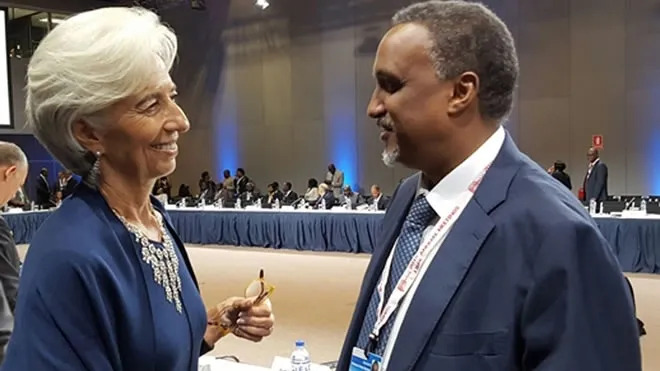Somali Magazine – The International Monetary Fund (IMF) has completed its one-month economic review in Africa which has resulted in $ 1 billion in financial commitments for seven of the eight nations pegged on approval by the IMF Executive Board.
IMF $ 1 Billion Funding Breakdown
The global lender funding breakdown will see Somali receive $100 million, the Democratic Republic of Congo -$200.39 million, Rwanda $262 million, Tanzania $150 million Gambia $10.9 million, Comoros $4.7 million, and Senegal $276 million.
Charalambos Tsangarides, who led the IMF team “Upon completion of the Executive Board review, Tanzania will have access to $150 million, bringing the total IMF financial support under the arrangement to $452.7 million.”
In Zimbabwe, the outcome of the IMF staff visit is expected to serve as a key input in the preparations for a Staff Monitored Program (SMP) while in Mozambique the IMF team resolved to continue its discussions in the context of the Third Review under the Extended Credit Facility (ECF) arrangement.
In Somalia, the IMF and the Somali authorities reached an agreement on key economic and financial policy reforms which now qualifies the country for a debt relief and an additional $100 million in financing under a three-year Extended Credit Facility (ECF) arrangement.
The financing which is still subject to the fund’s Executive board approval follows the considerable progress that Somalia has made in rebuilding its economy and institutions under the current ECF-supported programme since 2020.
“Somalia has maintained strong implementation of wide-ranging reforms to help strengthen key economic and financial policy institutions,” IMF team leader Laura Jaramillo said in a statement last week.
Since 2020, Somalia has seen significant strides in its economic and institutional reconstruction, under an IMF-supported program. The country has been diligently implementing comprehensive reforms to fortify key economic and financial policy institutions. This forward movement has set Somalia on a trajectory to reach the Heavily Indebted Poor Countries (HIPC) Completion Point by December 2023, which will unlock debt relief and facilitate the normalization of relations with its primary creditors.
Despite these advancements, Somalia continues to grapple with substantial challenges including economic, social, security, and climate risks. Poverty remains widespread, with an estimated 54% of the population living on less than $2.06 per day. The country’s growth rate is insufficient to mitigate poverty, address pressing social needs, or generate enough job opportunities for the youth. Moreover, Somalia’s vulnerability to climate shocks jeopardizes growth and impedes poverty reduction efforts.
The IMF’s post-HIPC policy priorities for Somalia include sustaining fiscal stability, enhancing domestic revenues, bolstering public financial management, promoting financial deepening and inclusion, improving the business environment and governance, and augmenting statistics.
Global lender pledge of financial aid to Somalia follows a month-long tour of several African states, including the Democratic Republic of Congo, Rwanda, Senegal, Mozambique, Gambia, Comoros, and Zimbabwe. During these visits, the IMF team engaged with authorities on critical economic, financial, social, and governance reform programs, unlocking millions of dollars for budgetary support and strengthening of international reserves.
The IMF’s engagements in these African nations underscore its commitment to supporting countries in their economic reform initiatives and promoting sustainable and inclusive growth. The financial aid extended by the IMF is vital for these countries to tackle their economic hardships, alleviate poverty, and build resilience against external shocks.

